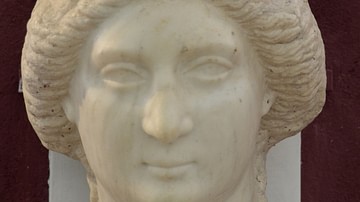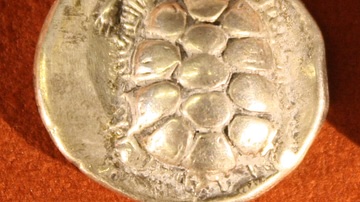Search
Did you mean: Saladin?
Search Results

Definition
Aristides
Aristides (520s – c. 467 BCE) was an Athenian statesman and military commander who gained the honorific title 'the Just' through his consistent selfless behaviour in public office. Although ostracized by the Athenian assembly, Aristides returned...

Definition
Battle of Plataea
The Battle of Plataea was a land battle between Greeks and Persians near the small town of Plataea in Boeotia in 479 BCE. Following up their naval victory at the Battle of Salamis in September 480 BCE against the same enemy, the Greeks again...

Definition
Helen (Play)
Helen is a Greek tragedy by Euripides (c. 484-407 BCE). It is usually thought to have first been performed at the Great Dionysia of 412 BCE and was part of the trilogy that included Euripides' lost Andromeda. Helen recounts an unusual version...

Article
Twelve Great Women of Ancient Persia
Women in ancient Persia had more rights and greater freedom than any other ancient civilization including, according to some scholars, even ancient Egypt which is famous for its respect for the feminine principle in religion as well as daily...

Article
Ten Great Ancient Mesopotamian Women
The lives of women in ancient Mesopotamia were regulated by a patriarchal hierarchy, but within this social structure, there were many who distinguished themselves and some who were able to assume positions traditionally held by men. Women...

Definition
Battle of Marathon
The Battle on the plain of Marathon in September 490 BCE between Greeks and the invading forces of Persian king Darius I (r. 522-486 BCE) was a victory that would go down in folklore as the moment the Greek city-states showed the world their...

Definition
Battle of Thermopylae
Thermopylae is a mountain pass near the sea in northern Greece which was the site of several battles in antiquity, the most famous being that between Persians and Greeks in August 480 BCE. Despite being greatly inferior in numbers, the Greeks...

Definition
Trireme
The trireme (Greek: triērēs) was the devastating warship of the ancient Mediterranean with three banks of oars. Fast, manoeuvrable, and with a bronze-sheathed ram on the prow to sink an enemy ship, the trireme permitted Athens to build its...

Article
The Delian League, Part 2: From Eurymedon to the Thirty Years Peace (465/4-445/4 BCE)
This text is part of an article series on the Delian League. The second phase of the Delian League's operations begins with the Hellenic victory over Mede forces at Eurymedon and ends with the Thirty Years Peace between Athens and Sparta...

Article
The Island Kingdom of Aegina: The Old Gods Still Whisper Their Truths
Today, traveling an hour by ferry from Piraeus, the port of Athens, the first remnant of Aegina's great past a visitor will see is the lonely pillar of Apollo rising from the trees on the hill of Kolona. Once a splendid complex of three buildings...